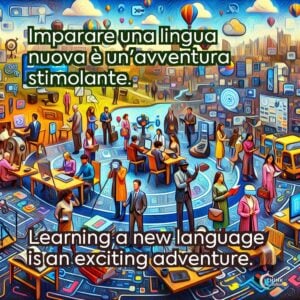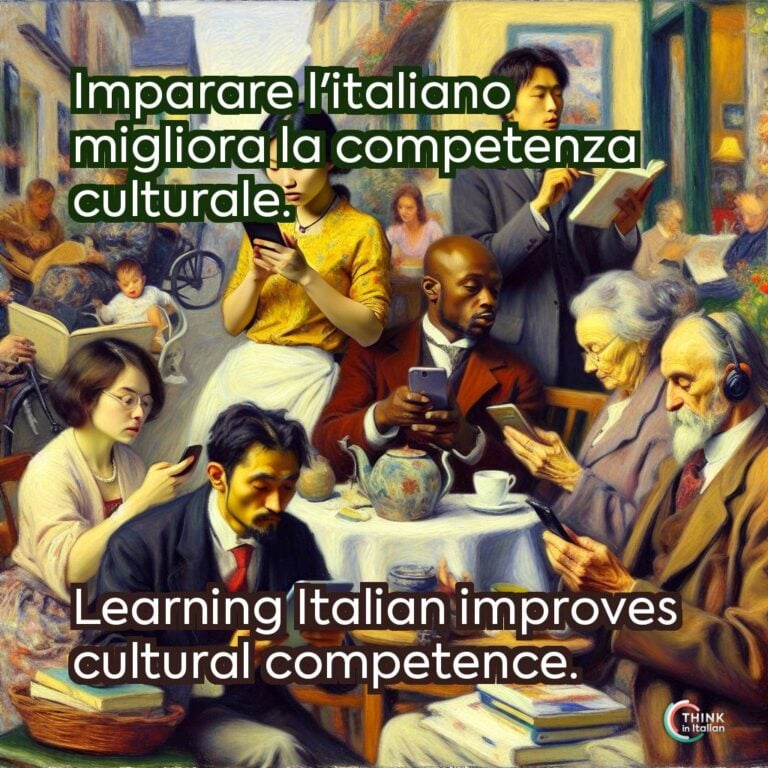Why Should I Learn a Foreign Language?
Let’s start from here: learning a foreign language is always a good idea. Learning a new language does not only allow communication, but it is a vigorous exercise for your brain.
Research has extensively shown the several benefits of learning foreign languages; it’s about learning a new skill and discovering a whole new world with new structures and ways of thinking.
I really think that learning new languages makes you see the world through a different lens, and research confirm that multilingualism affects your perceptions, but let’s now see the main reasons why you should learn a new language:
- Learning a foreign language enhances cognitive processes, improving skills like problem-solving, critical thinking, and multitasking, and it also boosts memory and brain flexibility.
- multilingual individuals often experience delayed onset of cognitive decline and dementia in old age.
- Language is a key to understanding and appreciating another culture deeply.
- knowing another language allows for a more nuanced appreciation of the arts, traditions, and habits of other countries.
- In an increasingly globalized world, being bilingual or multilingual can be a significant competitive edge.
- it can open up job opportunities in international business, and it can be a deciding factor in hiring, promotions, and international assignments.
- Learning another language improves overall communication skills.
- you will see metalinguistic improvements in your native language as well, including a better understanding of grammar, vocabulary, and sentence structure.
- Speaking the local language can transform travel experiences.
- it will allow deeper engagement with the place and its people, and provide a richer, more authentic experience.
Was this convincing enough? Are you ready to learn a new language yet? Then read why, among many languages, you should learn Italian.
Why Learn Italian?
Several authors in history have celebrated it:
(Italian is) the best composed language in terms of fluency and smoothness — James Howell, historian
I’m really in love with this beautiful language, the most beautiful in the world. I just need to open my mouth and unintentionally become the source of all the harmony of this celestial idolatry. Yes, dear sir, for me there is no doubt that angels in the sky speak Italian. — “Confessions by Felix Krull”, by Thomas Mann, writer
No European language has just as noble ancestries (…) no language was ever more perfectly ordained to express human emotions — “Eat, Pray, Love”, by Elizabeth Gilbert, writer
My Top 7 Reasons to Learn Italian
I do not want to sell my native language, but most people think Italian is the most beautiful language in the world, and well… I agree!
Its linguistic musicality makes Italian a pleasure to learn and speak, amplifying its appeal as the language of art, opera, and romance.
Besides this, another obvious benefit of learning Italian is that you’ll be able to communicate with Italian speakers.
You’ll have lots of people to practice the language with because Italian is spoken by around 85 million individuals. In fact, Italian is one of the most spoken language in the world!
Good news! If you do not have Italian speakers to speak to, you can always engage in conversations with an AI tutor.
By connecting and communicating with Italians in their native language, you’ll be able to grasp the subtleties of Italian culture, which is amazing!
Just think of Italy’s history, art, music, literature, architecture, landscapes, food, wine… You’ll be able to learn much more about all of that if you do it in Italian.
Now, dive with me among the 7 main reasons why I advise you to choose Italian as a foreign language to learn.
Professional Advantage
Speaking Italian might give you a competitive edge in the job market. In fields like fashion, culinary arts, and architecture, knowing Italian is invaluable.
It is a skill that makes you stand out in a crowded field, offering direct pathways to work in Italy or with Italian companies worldwide.
Cultural Competence
One of my students once said, “Learning Italian improved my cultural competence”. As his Italian language teacher, it is pointless to say that I felt flattered!
Italy is an archive of cultural heritage. Knowing this language opens the door to over 60% of the world’s art treasures, enriching your knowledge in art, history, music, and more.
Deeper Traveling Experience
Very closely linked to the previous claim, knowing Italian will make traveling through Italy a more profound experience.
Italy is the nation with the most UNESCO Heritage sites, so it is a great tourist destination!
From ordering un caffè, per favore (a coffee, please) to asking for directions with a simple scusi, dov’è il Colosseo? (excuse me, where is Colosseo?), speaking Italian enriches every interaction, turning simple transactions into memorable connections.
Self-Discovery
Learning a language is a journey of self-discovery. Italian, with its melody and expressive gestures, encourages you to open up and embrace spontaneity.
Learning Italian pushes you out of your comfort zone. It helps with your personal development, allowing you to not just learn new words, but to also understand the world through Italian eyes.
Emotional Connection and Heritage
Many learners feel a deep emotional connection to Italian, which may be tied to family heritage or a personal affinity for Italian culture.
In fact, all of my students want to learn Italian either because their partner or partner’s family is Italian, or simply because they love the country and the culture.
Regarding the first reason, they all have a common goal: being able to perceive and express the emotional connection when conversing.
The idea that learning Italian can help individuals reconnect with their roots makes me feel very proud of my job because for me, preserving family traditions is central and extremely important.
Artistic and Scientific Contributions
If you dive even shallowly into the history of the Italian language, you will immediately notice that this language is very rich in cultural, historical, and artistic references.
So, learn Italian to also understand the titles of great paintings like Botticelli’s Primavera without consulting a guide, or reading Leonardo da Vinci’s notebooks without the help of a translator.
As a linguist, I am a huge supporter of reading important literature masterpieces in their original language.
In fact, even in the best translations, something can be lost. If you value the power of words and storytelling, you understand how valuable it can be to read a text in its original version.
But Italy is a 360-degree cradle of culture. Italy’s scientific and technological contributions, from Galileo Galilei to contemporary advancements, are often overlooked.
Learning Italian can allow you to access historical documents and modern research, enriching your knowledge and appreciation of Italy’s scientific heritage.
Being able to access Italian contributions to fields like physics, medicine, and engineering showcases the language’s relevance beyond the arts and humanities.
Culinary Traditions, of Course!
I saved it for last, but it is probably my favorite reason to learn Italian!
Recently, Rome won the prize as the city with the best cuisine in the world, so why should you miss out on the opportunity to learn Italian to discover Italian recipes?
Learning Italian profoundly enriches the understanding and appreciation of Italian cuisine and lifestyle, offering insights into the country’s regional culinary diversity and language variations.
For instance, it may help you understand culinary terms that lose meaning in translation, like the difference between sugo and salsa, both translated as “sauce” but used differently across regions.
If you are a food lover like me, then Italian is the perfect language to learn. Being able to converse and read about Italian food will allow you to appreciate Italian food much better, I promise!
Influence on Other Languages
Italian has significantly influenced English and other languages, particularly in terms of vocabulary related to music, food, and fashion.
This influence enriches an understanding of not only Italian but also your own native language.
If you love learning languages in general, another great advantage you will enjoy while learning Italian is that it’ll be easier to learn other Romance languages, such as Spanish, French, or Portuguese.
This is because they all share the same ancestor: Latin.
How can I Learn Italian?
If you are wondering, there is no best way to learn Italian. Different methods apply to different people with different goals.
Make sure you have a clear idea as to why you want to learn Italian. Here, I provided you with many different clues, so just scroll through the article to choose your purpose.
Is it to travel? Or to better communicate with friends and family? Regardless of your main objective, my advice is to follow an Italian course.
Prioritize courses that give you tools to learn the language rather than those that only overwhelm you with new words.
Audio lessons are one of the best tools to do so! You will be able to learn fast by relying on speech and mimicking like you did when you learned your first language when you were born.
A Journey Worth Taking
Learning Italian is more than an academic aspiration. It’s a journey into the heart of a rich cultural heritage, a personal exploration that broadens horizons, enhances careers, and enriches travel experiences.
Whether you’re drawn to Italy for its history, art, music, or simply for the beauty of the language, each step in this journey is rewarding.
When embracing Italian, you not only learn a new language but also gain a deeper appreciation for one of the world’s richest cultures.
If you are ready to take the journey, then this is the right moment and the right place!








